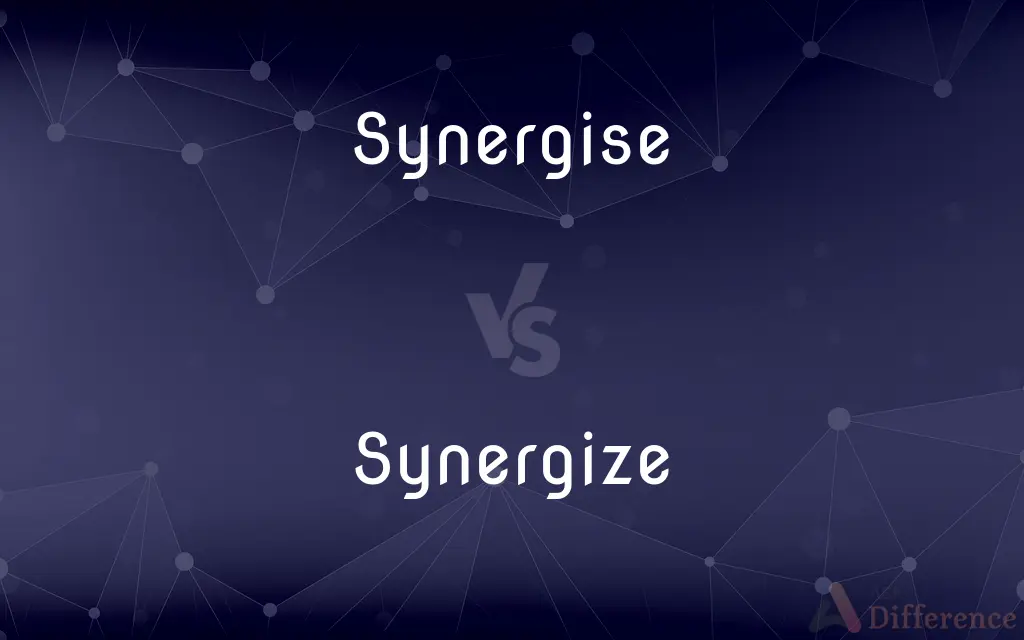Synergise vs. Synergize — What's the Difference?
By Tayyaba Rehman & Maham Liaqat — Updated on April 14, 2024
"Synergise" and "synergize" are alternate spellings of the same verb, indicating cooperative interaction; "synergise" is preferred in British English, while "synergize" is favored in American English.

Difference Between Synergise and Synergize
Table of Contents
ADVERTISEMENT
Key Differences
The word "synergise" is commonly used in British English to describe the process where two or more entities work together to produce a greater outcome than they would individually. Whereas, "synergize" follows the same definition but is the preferred spelling in American English, emphasizing the same concept of collaborative advantage.
When discussing spelling conventions, "synergise" aligns with other British English spellings that often retain 's' where American English uses 'z', like in "realise" vs. "realize". On the other hand, "synergize" reflects American English's tendency to use 'z', which is perceived as more phonetically accurate to the voiced consonantal sound.
In terms of pronunciation, both "synergise" and "synergize" are pronounced the same way, /ˈsɪnədʒaɪz/, despite their spelling differences. However, the spelling might influence perceptions of pronunciation in regions unfamiliar with one variant.
The use of "synergise" can sometimes signify an adherence to traditional British English norms and can be found in UK-based publications and documents. Conversely, "synergize" is more likely to appear in texts from American corporations and international business contexts, where American English is often standard.
In educational settings, British schools and universities may teach the 'synergise' spelling as part of their curriculum, reinforcing British linguistic identity. In contrast, American educational systems enforce the 'synergize' spelling, aligning with other Americanized spellings.
ADVERTISEMENT
Comparison Chart
Preferred Spelling Region
British English
American English
Spelling Variant
S (synergise)
Z (synergize)
Pronunciation
/ˈsɪnədʒaɪz/
/ˈsɪnədʒaɪz/
Common in
UK publications
US and international texts
Educational Use
Taught in UK schools
Taught in US schools
Compare with Definitions
Synergise
Collaborative effect.
They hoped to synergise their efforts to improve sales.
Synergize
Combine strengths.
We need to synergize our skills to compete.
Synergise
Produce a combined effect.
The teams synergised to streamline the process.
Synergize
Collaborative effect.
The new strategy will synergize the two brands.
Synergise
Combine strengths.
The departments must synergise to overcome challenges.
Synergize
Mutual enhancement.
Synergize your efforts for better results.
Synergise
Enhance efficiency.
Working together will synergise their project.
Synergize
Enhance efficiency.
To synergize our efforts, we should align our goals.
Synergise
Mutual enhancement.
By sharing resources, they can synergise their research.
Synergize
Produce a combined effect.
Merging these departments will synergize operations.
Synergise
Alternative spelling of synergize
Synergize
Combine or coordinate the activity of (two or more agents) to produce a joint effect greater than the sum of their separate effects
The two companies have been looking for ways to synergize their businesses
We have been able to synergize our efforts in supporting this worthy cause
Synergize
To act as a synergetic agent.
Synergize
To act in synergy; to work together to create an effect that is greater than the individual parts.
Common Curiosities
Can "synergise" and "synergize" be used interchangeably?
Yes, depending on the regional spelling preferences.
What does synergize mean?
Similar to synergise, it means the combined efforts of entities to create enhanced outcomes.
Why does British English prefer "synergise"?
It follows traditional British spelling rules, which often favor 's' over 'z'.
Can "synergise" appear in American publications?
It's rare but can appear in texts that use a more international or British style.
Is one spelling more correct than the other?
Neither spelling is more correct; the choice depends on the regional spelling norms of British or American English.
What does synergise mean?
It refers to the interaction or cooperation of two or more organizations to produce a greater effect.
Is "synergise" used in American English?
Rarely, as "synergize" is the standard American spelling.
Do computer spell checkers recognize both spellings?
Yes, most modern spell checkers are equipped to recognize both British and American spellings.
How can I remember which spelling to use?
You might associate "synergise" with other British spellings that use 's', like "organise", and "synergize" with American 'z' spellings like "organize".
Are there any industries that prefer one spelling over the other?
Industries tied closely to British markets might prefer "synergise", while those in the U.S. or with a global reach might opt for "synergize".
What are some synonyms for "synergise" and "synergize"?
Collaborate, cooperate, converge, amalgamate, and unite are all synonyms that capture similar meanings.
Why is "synergize" more common in international business?
"Synergize" is more prevalent internationally due to the global influence of American English in business and technology sectors.
Are there any pronunciation differences between "synergise" and "synergize"?
No, both words are pronounced the same way, /ˈsɪnədʒaɪz/.
What is the etymology of "synergise/synergize"?
Both forms come from the Greek word "synergos", meaning working together.
How does the use of "synergise" vs. "synergize" affect SEO?
Using the appropriate regional spelling can improve SEO in targeted markets, with "synergize" potentially reaching a broader, especially American audience.
Share Your Discovery

Previous Comparison
Sunglasses vs. Shades
Next Comparison
Rude vs. CrudeAuthor Spotlight
Written by
Tayyaba RehmanTayyaba Rehman is a distinguished writer, currently serving as a primary contributor to askdifference.com. As a researcher in semantics and etymology, Tayyaba's passion for the complexity of languages and their distinctions has found a perfect home on the platform. Tayyaba delves into the intricacies of language, distinguishing between commonly confused words and phrases, thereby providing clarity for readers worldwide.
Co-written by
Maham Liaqat













































